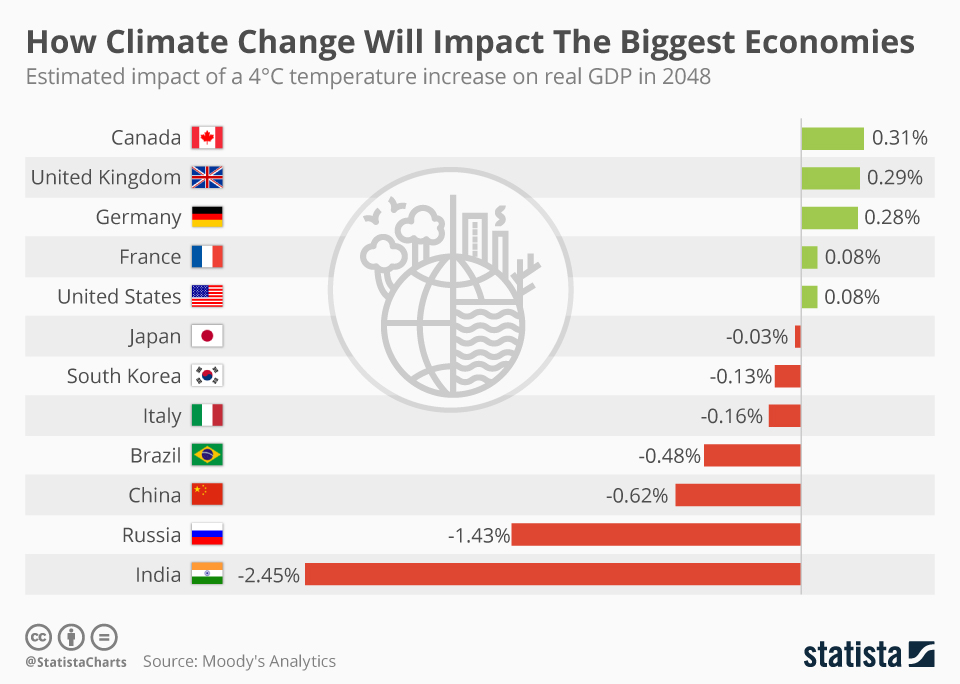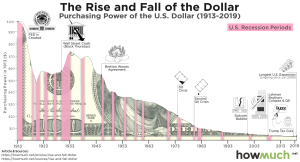The economic impact of climate change poses a significant challenge for global economies, as recent studies reveal alarming new projections. As the planet experiences rising temperatures, the economic forecast related to climate change indicates that each additional degree could result in a staggering 12 percent decline in global GDP. This drastic decline underscores the urgent need to address climate change costs, which could dwarf previous estimates by six times. As nations grapple with the implications of these findings, decarbonization policies are becoming critical in mitigating losses and ensuring sustainable growth. Understanding the connection between climate change and economic stability is essential for developing strategies that safeguard our future prosperity.
The financial repercussions of global warming have emerged as a pressing concern for policymakers and economists alike, highlighting the need for urgent action. The detrimental effects of climate fluctuations threaten to disrupt economic stability across the globe, driving productivity losses and challenging the resilience of various sectors. Researchers have begun to delve into comprehensive climate change studies that link temperature rises with GDP fluctuations, paving the way for more informed economic planning. These insights not only emphasize the cost of inaction but also support the development of robust decarbonization initiatives aimed at curbing emissions. Ultimately, recognizing the economic ramifications of our changing climate is pivotal in shaping effective environmental and fiscal strategies.
Understanding the Economic Impact of Climate Change
The economic impact of climate change cannot be overstated, with recent research suggesting projections that are significantly alarming. Bilal and Känzig’s findings indicate that each 1°C rise in global temperature could lead to a staggering 12% decline in global GDP. This is a dramatic shift from earlier estimates, which may have lulled policymakers into a false sense of security. As this new data emerges, it becomes clear that the economic costs of climate change will escalate much faster than previously realized, affecting productivity on a global scale.
The consequences of climate change extend beyond immediate economic losses. For instance, the anticipated GDP losses due to climate change could reshape national and global economic strategies, forcing adaptations in sectors like agriculture, insurance, and infrastructure. Countries would need to rethink their economic forecasts as the traditional models fail to encapsulate these looming threats. Moreover, with the reality that as temperatures rise, extreme weather events become more frequent, businesses must prepare for potential disruptions that can arise from natural disasters, affecting both supply chains and consumer behavior.
Revising Economic Forecasts: The Challenge Ahead
For economists, revising economic forecasts in light of climate data presents a formidable challenge. The need to integrate climate change variables into economic models represents a paradigm shift—moving from solely predictive analytics based on historical data to incorporating dynamic climate-related impacts that can alter long-term projections. These revisions are crucial not only for understanding future GDP impacts but also for planning effective economic policies to mitigate potential downturns arising from climate-induced disruptions.
Furthermore, traditional economic models that prioritize growth without integrating climate dynamics risk underestimating the ongoing costs associated with global warming. The integration of climate change studies into economic forecasting demands a holistic approach that acknowledges the interplay between environmental factors and economic health. This involves re-examining how technological advancements and economic growth perpetuate emissions, which in turn accelerate climate change, creating a feedback loop that complicates future projections.
The disconnect between climate science and economic forecasting must be addressed, as ignoring these developments will lead to inadequate responses to the challenges posed by climate change. Policymakers, businesses, and economists must collaborate to create models that: reflect the true costs associated with carbon emissions, factor in potential GDP losses, and ultimately inform effective decarbonization policies to arrest these trends.
The Costs and Benefits of Decarbonization Policies
A crucial aspect of addressing climate change lies in the implementation of decarbonization policies. The striking findings of Bilal and Känzig compel nations, especially large economies like the U.S. and European Union, to reconsider their approach to climate action. The recent estimate indicating a social cost of carbon at $1,056 per ton starkly contrasts with older figures and underscores the urgent need for robust decarbonization interventions. These policies are not merely expenditures; they represent a long-term investment in sustainable economic health.
By effectively recalibrating the economic implications of carbon emissions, policymakers can identify cost-effective strategies for emissions reduction that surpass the benefits offered by a fossil fuel-dependent economy. Programs supported by the 2022 Inflation Reduction Act illustrate that investing in clean technology can lead to significant long-term savings. The economic forecast for climate change thus transforms from viewing decarbonization as a burden to recognizing it as an essential strategy for safeguarding future economic stability.
Extreme Weather Events and Economic Stability
The relationship between extreme weather events and economic stability presents a critical area of study as climate change accelerates. Increased temperatures correlate not only with rising sea levels but also with a heightened frequency of droughts, floods, and hurricanes that disrupt local economies and infrastructure. These extreme weather events can precipitate devastating capital losses, leading to long-lasting impacts on productivity and economic resilience.
As such, businesses today must prepare comprehensive risk management strategies that account for the increasing unpredictability of climate-related disruptions. This adaptation requires a reevaluation of investment priorities, focusing on sustainable practices that can enhance resilience against the backdrop of a changing climate. Moreover, investing in infrastructure that can withstand extreme weather events is not merely a preventative measure; it also serves as a key driver for economic growth in sectors concerned with sustainability and climate resilience.
Global Cooperation on Climate Policies
The urgency of the climate crisis necessitates a coordinated global response to mitigate its economic impacts. In light of the stark economic forecast regarding climate change, international collaboration on climate policies becomes imperative. Countries must engage in discussions to establish comprehensive frameworks that equally distribute the burdens and benefits of climate action, allowing for a more equitable approach to global warming mitigation.
Such cooperation could take the form of shared technology, financial investments in developing nations, and the establishment of internationally recognized standards for emissions reductions. By fostering an environment of collaboration rather than competition, nations can work towards collectively reducing GDP losses due to climate change. This not only strengthens global economic stability but also cultivates a united front against the diverse threats posed by climate events.
Investment in Climate Resilience Strategies
Investment in climate resilience strategies is critical for economies to withstand the potential effects of climate change on their livelihoods. As projections indicate severe GDP impacts from each rise in temperature, governments and companies alike must allocate resources to develop infrastructures, technologies, and practices that bolster their capacity to thrive in a warming world. This is not just about avoiding losses; it is about seizing new opportunities presented by the green economy.
Investment channels might include renewable energy projects, community adaptation programs, and innovations in sustainable agriculture that not only mitigate climate change effects but also align with broader economic goals. By prioritizing climate resilience, countries can enhance their long-term economic stability, ensuring that as they confront the challenges presented by climate change, they emerge stronger and more adaptable.
Public Awareness and Climate Change Economics
Cultivating public awareness about the economic implications of climate change is paramount for garnering support for necessary policy changes. The broader society must understand that the costs associated with climate change extend far beyond environmental degradation—they encompass actual fiscal consequences that can affect livelihoods and economic welfare on a global scale. Educating the public about climate change costs, including GDP impacts, allows individuals to recognize the urgency of the situation.
Broad participation in climate discussions can foster a culture of sustainability, encouraging businesses and consumers to alter their practices to support environmental initiatives. When the public comprehends the potential ramifications of climate inaction, they become more likely to advocate for policies that drive decarbonization and bolster economic forecasting that includes these vital climate dimensions, contributing to a proactive approach towards climate change.
Future Directions for Economic Studies on Climate Change
Looking forward, economic studies on climate change must evolve to incorporate more nuanced understandings of how climate dynamics will affect economic variables. Future research should emphasize interdisciplinary collaboration that merges economic forecasts with climate science, harnessing data analytics tools to create more predictive models. These models must consider various scenarios, including extreme weather patterns and their cascading effects on the economy, leading to more informed policy decisions.
Additionally, including LSI terms such as ‘climate change study’ and ‘economic forecast climate change’ in ongoing research will further enrich the dialogue surrounding the economics of climate action. As the challenge of climate change persists, fostering a rich academic environment centered on innovation in methodologies can lead to a more proactive approach in addressing the formidable economic impacts associated with climate change.
Frequently Asked Questions
What are the economic impacts of climate change on global GDP?
Recent studies indicate that the economic impact of climate change is significant, with projections suggesting that each additional 1°C rise in temperature could lead to a 12% decline in global GDP. This stark forecast indicates that the costs associated with climate change exceed previous estimates by sixfold, highlighting the urgent need for effective decarbonization policies.
How do climate change costs affect economic forecasts?
The economic forecasts related to climate change costs have seen a substantial upward revision, as new models suggest greater sensitivity of global GDP to rising temperatures. The recent analysis highlights that ongoing climate change could result in a 50% reduction in output and consumption if temperatures increase by an additional 2°C by the end of the century, emphasizing the importance of integrating climate models into economic forecasting.
What role do decarbonization policies play in mitigating the economic impacts of climate change?
Decarbonization policies are critical in mitigating the negative economic impacts of climate change. As indicated in recent studies, effective policies can reduce the social cost of carbon significantly, with estimates showing a cost of $211 per ton for the U.S., which is considerably higher than previous assessments. This suggests that proactive approaches can lead to major economic benefits, making decarbonization a cost-effective strategy for large economies.
How does climate change contribute to GDP losses in different countries?
Climate change contributes to GDP losses globally through increased extreme weather events and rising temperatures affecting capital and productivity. A new economic study model predicts GDP damages across 173 countries, revealing that without significant action to address climate change, the economic repercussions could manifest as significant generational losses in wealth and output, reinforcing the critical need for comprehensive climate change studies.
What is the predicted economic toll of climate change by 2100?
Predictions regarding the economic toll of climate change by 2100 indicate that global temperatures rising could potentially halve economic output and consumption, equating to an economic decline twice as significant as the Great Depression, but extending indefinitely. Such forecasts underscore the urgent need for robust climate strategies to counteract these impending economic threats.
| Key Point | Description |
|---|---|
| New Economic Projections | Recent study forecasts economic losses due to climate change that are six times larger than previously estimated. |
| Impact of Temperature Rise | Every additional 1°C increase is projected to reduce global GDP by 12%. |
| Extreme Weather Correlation | Global temperature rise is associated with increased frequency of extreme weather events compared to local temperature changes. |
| Future Economic Projections | A 2°C rise by 2100 could reduce output and consumption by 50%, representing long-lasting economic damage. |
| Social Cost of Carbon | New estimates place the global social cost of carbon at $1,056 per ton, significantly higher than previous estimates. |
| Decarbonization Viability | Decarbonization policies show strong cost-benefit potential for major economies like the U.S. and EU. |
Summary
The economic impact of climate change is profound, as recent studies highlight significantly higher projections of economic loss. With global temperatures already 1°C above pre-industrial levels, the forecast indicates that each additional degree increase will severely damage global GDP, resulting in losses that could quintuple previously understood risks. This research underscores the urgent need for effective decarbonization policies, which now demonstrate clear economic benefits, suggesting that investing in climate action is not just necessary for environmental preservation but also for maintaining economic stability.




